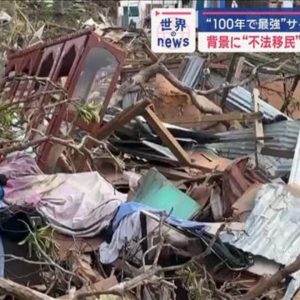Snow fell in London today as Britain was gripped by an Arctic chill with temperatures falling well below zero, trains cancelled, cars stuck and schools closed.
Commuters faced travel chaos and the coldest UK temperature this early in the season since 1998 was recorded as Braemar in Aberdeenshire fell to -11.2C (12.2F).
The Met Office imposed three yellow weather warnings for snow and ice today across the Midlands and North of England, Wales, Scotland and Northern Ireland.
And the UK Health Security Agency issued the first amber cold weather health alert of the season, warning conditions could be dangerous for vulnerable people.
Poor weather impacted rail routes, with no trains able to run between Nottingham and Worksop or between Llandudno and Blaenau Ffestiniog in North Wales.
Northern services across Yorkshire between Bradford and Huddersfield, Hebden Bridge to Halifax and Halifax to Hull were also impacted, while flooding near Ulverston in Cumbria caused disruption between Barrow-in-Furness and Lancaster.
Some 130 Welsh schools shut across Wrexham, Powys, Denbighshire and Flintshire – while closures were also reported in Birmingham, Nottinghamshire and Derbyshire.
Nearly 5in (12cm) of snow fell at Watnall in Nottinghamshire, with 3in (8cm) recorded at Cranwell in Lincolnshire and 2in (5cm) at Lake Vyrnwy in Powys, Wales.



The Met Office warnings advised that vehicles could be stranded, power cuts may occur, rural areas could be cut off and there was a risk of injury from slipping on ice.
A yellow warning for England was issued until 11am and a warning for Scotland will remain in place until 10am tomorrow.
Another warning for Northern Ireland expired at 10am this morning.
The UK Health Security Agency issued an amber cold weather health alert for the East and North of England, the Midlands, and Yorkshire and the Humber,
Yellow health alerts also came into place for the South East, South West and London at 8am today, lasting until 6pm on Saturday.
National Rail warned the cold climate would affect various routes on northern train services until at least 2pm this afternoon.
Merseyrail issued an alert warning passengers that due to the potential of snow and ice covering tracks, the first service on each line in North West England ran without customers to ensure conditions could be checked.
National Highways also sent out a severe amber weather alert for snow, with the M1 in Leeds and Sheffield, the M56 in Manchester, junction 39 of the M6 and junctions 21-23 of the M62 likely to see disruption.



The Met Office, which described the conditions as ‘the first taste of winter’, said heavy snow would prove disruptive in England, with Derbyshire being the area most likely to be affected.
Dan Suri, Chief Meteorologist at the Met Office, said: ‘An area of low pressure slides its way eastwards on Monday night.
‘The associated frontal system, marking the boundary between cold air in the north and milder conditions to the south, will bring disruptive snow to some areas between Monday evening and Tuesday morning.
‘This is likely to coincide with rush hour, leading to disruption to some transport routes across a central swathe of the UK on Tuesday morning. It will also be windy in the far south.’
The Alzheimer’s Society warned that cold weather can be ‘particularly challenging’ for people with dementia.
‘Colder temperatures can be difficult for a person with dementia to adjust to, and they may not always be able to communicate that they are cold – or they may not even recognise it themselves,’ the charity said.
It advised the public to check in on loved ones, friends and neighbours living with the condition.
Dr Agostinho Sousa, from the UK Health Security Agency, said: ‘This is the first amber Cold Weather Health Alert of the season, but we can expect more as we approach winter, and it is vital to check in on vulnerable friends, family and neighbours to ensure they are well prepared for the onset of cold weather.
‘Particularly if they are elderly or otherwise at increased risk.’




























Age UK director Caroline Abrahams said the charity was worried that the loss of the Winter Fuel Payment has caused many older people to be ‘extra fearful’ about turning on their heating this winter.
‘With high energy bills and food prices it is understandable that some may think they have to cut back on food and turn their heating off, but prolonged exposure to cold temperatures can have a serious impact on an older person’s health, especially if they are already trying to manage existing illnesses,’ she said.
‘The cold raises blood pressure, which in turn increases the risk of a heart attack or stroke and breathing in cold air can also increase the risk, and impact, of serious illnesses like flu and pneumonia.’
Ms Abrahams said it is ‘vital’ that older people stay ‘fit, warm and well if they can’ by having hot food and drinks throughout the day, wrapping up warm and sleeping with the windows closed.
Another charity Asthma + Lung UK urged those living with lung conditions to be ‘extra careful’.
The charity warned that cold weather can trigger potentially life-threatening asthma attacks or ‘flare-ups’ for people with other lung conditions.
Erika Radford, head of health advice at Asthma + Lung UK, said: ‘Your risk of ending up in A&E doubles in winter if you have a lung condition.


























‘We’re here to help you to stay well, however every day people with lung conditions are needlessly suffering and without urgent action more lives will be put at risk.’
And RAC Breakdown spokesperson Alice Simpson said: ‘The first taste of winter means drivers are suddenly contending with the some of the worst road conditions we’ve seen all year.
‘With freezing temperatures already causing disruption in the east and north of England, Wales, Scotland and Northern Ireland, and snow showers now affecting regions further south, we advise motorists to plan well ahead and only make journeys if absolutely essential.
‘Drivers should ensure their tyres have plenty of tread and are inflated to the correct pressure to give them the best possible grip on the road.
‘It’s best to stick to major roads, rather than rural areas where surfaces may not be gritted, reduce speeds and leave plenty of space behind the vehicle in front to ensure you have more time to stop.
‘Everyone should travel prepared in case they find themselves broken down at the side of the road: a blanket, warm waterproof coat and gloves, sturdy footwear and a charging cable and mobile power bank are all essentials.’
Have you been affected by the snow? Please email: tips@dailymail.com




